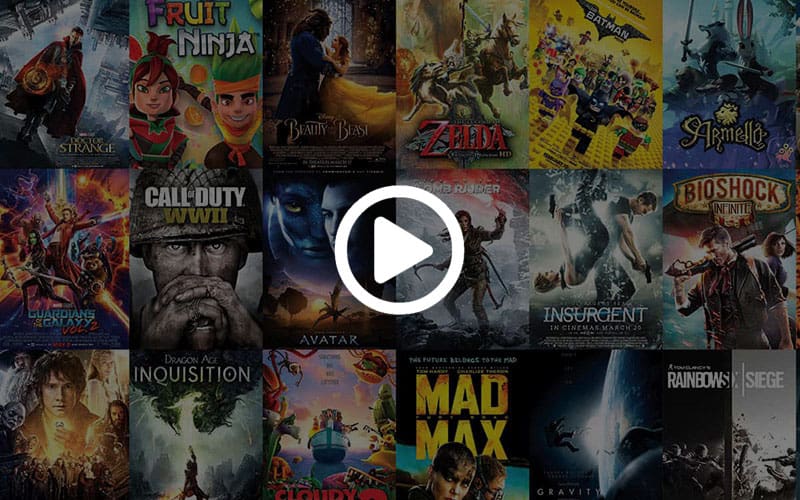Intake Dates
Advanced Diploma
June 2025
February 2026
Bachelor Degree
March 2026
Duration
Advanced Diploma
2 years
Bachelor Degree
3 years
Fees
Advanced Diploma: VETSL approved
Domestic / International
Bachelor Degree: FEE-HELP approved
Domestic / International
Unleash your creativity in Game Art & Animation
Embark on the ultimate creative journey where you’ll weave masterpieces of game art – from enchanting environments to iconic characters – and bring them to life through stunning animation. If you're a budding artist with a passion for games, then AIE’s specialist courses will get you up to speed with all the latest knowledge and ready to work in the game industry.
Under the guidance of industry professionals, you'll explore cutting-edge tools and techniques to forge artwork that showcases your talent. Imagine and collaborate with like-minded programming and design students in our immersive program, where you'll craft spellbinding experiences that captivate gamers.
Why study game art with AIE?
Industry software you will learn
Your career in Game Art starts through the hands-on Advanced Diploma or take your knowledge to the next level with the Bachelor Degree. Both programs have been closely developed with the game industry and leverage the latest game industry software including:
Hear from our graduates








Bachelor Degree Curriculum
Semester 1
In GDC101 Introduction to game art, you will learn the fundamentals of the game art pipeline. You will develop an understanding of key areas within the game art pipeline including 3D modelling, texturing, materials, rigging, animation, and lighting.
In this subject, you will create two 3D models textured and presented in Unity, one of which includes animation. The assessment also includes a peer review report and completion of weekly tutorial tasks.
Introduction to Game Design introduces the methodologies and common language used by designers to make games. You will understand how to analyse and respond to feedback objectively when presenting ideas and concepts to your peers.
You will create and maintain design documentation, effectively identify, communicate and resolve technical issues, refine mechanics, scope and gameplay requirements through design iteration.
You will learn how to identify and analyse your target market understanding business models for distribution, monetisation and player retention.
GDC103 offers an introduction to rapid prototyping and game programming using visual scripting. You will learn about the process of developing games in the Unity game engine, as well as foundational programming logic and design concepts. The subject emphasizes rapid prototyping using visual scripting, ethical considerations related to software licensing, and programming for diversity, including supporting disabled players through input and user interface design. You will be introduced to the theoretical and practical aspects of programming games in Unity, including scripting events, processing player input, building for different hardware, software licensing, IP rights, graphical user interfaces, and implementing basic game mechanics using visual scripting.
GDC100A is a cross-disciplinary unit that focuses on game development in a team-based environment. In this unit, you'll learn the basic concepts of project management and the different roles involved in game development. You'll explore the pre-production stage of game development, including prototyping, proof of concept methodologies, and game documentation.
Through this unit, you'll develop essential skills in communication, teamwork, and self-management. You'll gain an understanding of different game development methodologies and learn how to work efficiently in a development environment. You'll also learn how to effectively manage a game project, creating some of the pre-production documents that AAA game studios use during game development.
Semester 2
In this unit, building of GDX101, you will further explore level design theory and examine the evolution of game engine technology commonly used by today's developers, understanding game engine concepts and terminology and the role of a designer within a game development environment. You will learn how level designers conceptualise and prototype levels using game engines and 2D and 3D software packages, and you will be introduced to the methodologies and toolsets that take a level design from paper to playable build. You will also examine some of the fundamental concepts used in level design to deliver a logical, consistent and fun player experience, and examine the relationship between mechanics and environment, the role of the camera and the impact of light and sound in game environments.
In this subject you will learn the principles and visual communication used in graphic design and how these foundations apply to game art and game design. Students will develop an understanding of art movements and influences they have on game art, colour theory, visual hierarchy, composition, and marketing for games.
Assessment for this subject is based on understanding of visual design and aesthetic principles as you work to a specific design brief to create a digital promotional poster for a game. You will also write a research report on the influence of art movements in games and create an effective game style guide based on a provided brief.
In GDX103 Art Optimisation Techniques, you will delve into the world of creating optimised and efficent game art for real-time purposes. The technical understanding of how art assets impacts performance, and ways to optimise assets for efficiency, is essential for any artist working in the games industry. In this subject you will learn about graphic rendering pipelines, how to analysing and using profiling tools, mesh optimisation and level of detail, culling, draw calls, texture formats, mipmaps, modular assets, and instancing.
Students will be assessed through optimising and increasing efficiency on a game project by analysing performance, reporting findings, identifying solutions, and implementing changes. Students will also create two optimised 3D models suitable for low end platforms and devices.
In this unit, you will learn how to develop a 2D game prototype using agile development methodologies and effective teamwork. Building upon skills learnt in GDC100A, you will use a game engine to design a basic level and iteratively produce a game prototype with other team members who have diverse skills in game art, design, and programming.
Through the group project, you will gain fundamental knowledge of group dynamics, problem-solving, and version control repository management. You will learn to communicate and work effectively in a team environment, evaluate team performance, and provide constructive feedback to your peers in a professional manner.
This unit is crucial for anyone interested in pursuing a career in the game industry. It will teach you the skills required to work effectively in a game studio environment, including agile development methodologies, playtesting, and game prototype development. You will be assessed on your ability to create an initial game prototype and a final game prototype as a team, as well as present your work and evaluate your team's performance.
Semester 1
Whether you are doing hand-drawn animation with paper and pencil or using the latest digital technology to animate a game character, the goal of animation remains the same; creating the illusion of life. This unit will build on the fundamental animation knowledge and skills learnt in GDC101 Introduction to game art.
You will learn about the history and origins of animation, including 12 principles of animation which are the set of rules that underpin all good animations. You will learn how to animate with a number of rigged 3D models, using a variety of animation tools within Maya. You will apply your knowledge of the 12 principles of animation and technical animation skills through a series of guided lessons and exercises to create polished, appealing animation.
In this unit you will explore the key principles and theories of human-computer interaction (HCI) and study user experience (UX), user interface (UI) and gamification concepts to design interfaces for interactive systems. You will learn about input/output (I/O) channels, interaction models and frameworks, memory and information processing in humans and computer systems for the development of intuitive interfaces that users can easily grasp and control.
You will also develop skills in articulating and critically evaluating UX design ideas and practice wireframing to creatively solve UI design and gamification problems by redesigning and prototyping new experiences. You will adapt your UX knowledge and skills across diverse enterprise contexts that underpin the development of digital games and applications.
This subject provides you with the knowledge needed to plan and bring game environment ideas and concepts into reality. You will learn industry standard software, workflows, and techniques used to create 3D game environments modularily. GDA101 covers the entire processes including style guides, grey boxing, sculpting, retopology, baking, texturing, material creation, and presentation.
Students are assessed through practical application by creating an imaginative style guide and a small enviromental piece presented beautifully in a game engine. You will also develop critical skills in problem-solving, communication and self-reflection through the production of technical documentation, reports and self-reflective journals recording the creative process.
Building on the knowledge and skills gained in GDC100B Game development project 2, you will work in a team to design and develop a 3D narrative-based game and produce more complex game documentation including a game design document, art bible and technical design document, and evaluate other teams’ games through pilot playtesting and critique. You will adapt the scope and focus of your project using iterative system design principles throughout development, focusing on an initial, simplified implementation that progressively gains more complexity and a broader feature set until the final system is complete. You will obtain weekly feedback from a supervisory team of academics, regarding the project in progress and utilize this feedback to develop next iteration of the prototype.
You will further develop your teamwork skills forming an interdisciplinary team and demonstrate intermediate level design skills through the creation of a game concept. Your team will draft the system architecture and produce a level of the game prototype using a commercial-level game engine. The group project will utilise the individual skills of team members in game art, design and programming to collaborate effectively on the final product in a studio-simulated environment. Your individual contributions will form part of your professional portfolio.
Semester 2
Great characters are central to the success of many games. Players connect emotionally to a game by living vicariously through a character in the game world. In this unit, you will extend your creative skills and technical knowledge from GDA101 Modelling and texturing for game environments to develop appealing game characters.
You will learn various aspects of the character pipeline, critically analyse existing characters and devise character designs that are interesting and technically efficient. You will undertake pre-production and planning for characters and learn the principles of character design, taking into consideration diversity and the ethical and social implications of stereotypes and bias in video games. Study of the fundamentals of human anatomy, character texturing techniques and the importance of good topology for rigging and animation in this unit will enable you to produce professional game characters for real-time engines.
Good lighting and visual effects (VFX) can have a big impact on the look and feel of a game. Lighting and VFX not only unify visual elements within a game environment, they also bring a game world to life, creating a more engaging and immersive experience for the player. In this unit, you will extend your understanding of digital lighting from GDX103 Art optimisation techniques and develop the skills and knowledge to create both basic and advanced particle systems as well as explore physics and simulation for games.
You will learn about the physical properties of light, how light interacts with materials and the fundamentals of lighting design for games. Through researching and analysing lighting design in existing games and undertaking practical lighting studies, you will learn how to apply initiative and judgement to a range of techniques within a game engine to achieve lighting for different scenarios and applications. You will also learn about different kinds of VFX for games and how they can breathe life into environments, enhance game feel and create a more immersive experience for the player.
Expanding your knowledge of GDX102 Graphic design principles and GDC201 Human computer interaction and user experience design, this unit explores graphical user interface (GUI) design concepts in video games with a primary focus on the methodologies used to implement creative, practical and efficient graphical user interface design solutions in games.
You will examine popular game devices and compare and contrast the limitations imposed on player control methods and usability, identifying the solutions designed around bespoke platform user interface design and peripheral functionality. Having the skills and knowledge to identify and implement player-centric design principles will help you to ensure that the human-computer interaction component in your GUI design is intuitive and logical and translates directly to your target audience.
You will examine the principles of visual periphery and compare and contrast the functionality of screen and world spatial GUI solutions including the diegetic and non-diegetic designs applied across competing hardware platforms. You will demonstrate your skills and knowledge in player-centric design and the design of graphical user interfaces by submitting a GUI wireframe. You will also critically evaluate and self-reflect on your work in a written report."
In this unit, you will build upon the 3D prototype designed in GDC200A Game development project 3. You will gain intermediate level knowledge of project development while leveraging technical skills in your area of specialisation to complete and deliver the vertical slice and produce detailed game documentation and a post-mortem. In a studio-simulated environment, you will work in groups to manage the continued production of a 3D narrative-based game using a commercial-level game engine, exploring the quality assurance process and the production and post-production stages of game development such as scheduling, budgeting, marketing and playtesting to produce a vertical slice of the game.
You will adapt the scope and focus of your project using iterative system design principles and utilising weekly feedback from a supervisory team of academics regarding the project in progress, you will develop the next iteration of the prototype.
You will further develop your teamwork skills through the creation of a game concept. In addition to developing your project you will be involved in providing constructive feedback to your peers in a professional manner at the end of this unit.
Semester 1
Animators apply the same techniques and strategies as screen or stage actors to breathe life into characters and create the illusion of thought, emotion and personality. In this unit, you will build on the animation and character development skills and knowledge learned in GDA201 Principles of animation and GDA202 Character pipeline. You will animate 3D characters for games and demonstrate advanced technical and theoretical knowledge of the character animation pipeline. You will also undertake animation planning and pre-production to develop a character biography, animation description, and storyboards. Other elements in this unit include body mechanics and appealing poses, creating animation cycles for game characters and animation blending. You will also learn facial and upper body animation for game cut-scenes and how to deliver believable character emotion and expression when animating to audio dialogue.
You will also apply initiative and judgment when researching, analysing, and recording animation references material and footage, and further develop your critical evaluation skills via direct communication with peers and during class presentations. You will learn to professionally respond to feedback received and show how you have incorporated it into your work.
This unit builds on the concepts of gameplay introduced in GDC102 Introduction to game design and explores digital games and their social, cultural, psychological and ethical impacts on society. You will be introduced to theories of the social context of play and examine its relationship to digital gameplay, the player experience and human wellbeing, and evaluate how games can be used as positive tools for wellbeing.
Through a critical examination of existing literature, you will identify an area of societal wellbeing where games are not being applied to address social, cultural, psychological or ethical issues. To bridge this gap, you will design a game concept to meet the needs of this particular population. You will also develop skills in articulating ideas for innovative game concepts for wellbeing and be able to reflect upon and document your own ideas with reference to existing theories.
Virtual reality (VR) provides highly interactive and seamless immersive experiences and augmented reality (AR) technology allows users to interact with virtual objects, people and settings that have been overlaid onto real-world environments, augmenting user experience with computer-generated imagery and sounds. In this unit you will explore the pioneering developments in visualisation, immersion, and interaction to investigate innovative concepts and implementations in VR and AR. You will learn how simulation techniques are used to build virtual worlds in which users are immersed to deceive the human senses so that the perceptual cues that reach the brain are aligned with an alternative reality.
You will develop knowledge of a range of hardware and software available to game developers to produce immersive experiences in mixed media and examine state of the art methods for real world motion tracking to enable augmented spaces. Through a critical analysis of contemporary VR and AR technologies and applications in advergaming you will explore the design principles and content creation process for developing VR and AR applications by designing and deploying your own innovative concept in a group project.
This unit is the first part of the capstone project in which you will work in a studio-simulated environment on the production of a potentially commercially viable product. You will consider human computer interaction and user experience design in game development, applying the tools and techniques necessary to design novel gameplay experiences. You will explore technological advances, propose new techniques for human-computer interaction in a game development project.
You will work through aspects of the industry-based game development cycle, building on the knowledge and skills gained in GDC200B Game development project 4 and GDC201 Human-computer interaction and user experience design to further develop your teamwork skills and demonstrate advanced level design skills through the creation of an alpha version of an original and innovative game. The group project will utilise the individual skills of team members in game art, design and programming in collaborating effectively on the final product in a studio-simulated environment. Your individual contributions will form part of your professional portfolio.
You will be working more independently, while receiving feedback from your supervisor as a group, and utilising the skills you have gained to create a game that will form the heart of your portfolio. You will also provide constructive feedback to your peers in a professional manner and reflect upon and document your own performance and role in this project.
Semester 2
This unit provides an opportunity for students to complete work-integrated learning (WIL) through a full-time internship (36hrs/week) over the course of a semester. The unit will help you gain local professional experience in the game industry and choose from a diverse range of roles. You will need to apply for an internship position with an industry partner of AIE Institute or present an organisation and project for approval. If selected, you will undertake professional responsibility for a range of tasks and duties at a workplace in the game industry. For the major part of the unit, you will work with both an Industry Mentor (the nominated representative of the internship location) and an AIE Institute WIL Coordinator to complete a major internship project or a few smaller game development projects.
Project topics will be agreed between the AIE Institute, the student and the industry partner, and will also include playtesting. The specific work projects/ and related duties you will undertake will be determined in consultation between you, your Industry Mentor and AIE Institute to ensure appropriate standards are maintained and the internship project/s and related tasks align to the course learning outcomes.
Throughout the internship, you will be expected to maintain communication with your WIL Coordinator via email. You will be required to submit internship reports that reflect on your learning during the internship.
* Limited positions may be available, and a selection process applies. Learn more here.
OR complete GDC300B Major game production 2 and two Elective Units
This unit is the second part of the capstone project building upon skills learnt in GDC300A Major game production 1 and progressing the alpha version of the game your team developed. You will progress through the industry development cycle to the completion of a publishable gold version. You will demonstrate advanced level knowledge of project development while leveraging technical skills in your area of specialisation, deliver game documentation and a post-mortem. You will apply professional level teamwork and project management skills and demonstrate advanced level design skills during the development and completion of the game.
You will also apply basic business planning skills to pitch a business plan, explore production and post-production stages, and complete your individual professional portfolio. You will be working more independently, while receiving feedback from your supervisor as a group, and utilising the skills you have gained throughout your study.
The final stage of the project requires you to provide constructive feedback to your peers in a professional manner and reflect upon and document your own performance and role in this project from initial design in GDC300A to final completion.
Shaders are user-defined programs designed to run on a graphics processor to execute one of the programmable stages of the rendering pipeline. In this unit, you will study the history and evolution of shaders in video games. Building on your knowledge of GDX103 Art optimisation techniques, in this unit you will explore some of the key advances made in shader graphics and become familiar with the industry pioneers who have influenced and contributed to the technology used by many contemporary game engines. You will review the introduction of hardware acceleration, the competing Open GL and Direct X APIs and the resulting GPU wars of the late 1990s that would ultimately shape the computer graphics landscape for the next two decades.
You will develop the skills and knowledge to design and create custom shaders in a game engine using current tools and techniques. Analysing the basic structure of a shader script, you will learn how today’s shaders can be easily assembled and modified in a game engine using visual editing systems. On completion of this unit you will understand the history and evolution of shader technology and how to develop and modify basic shader materials for game designers and game artists through practice-based exercises.
This unit will explore the nature of entrepreneurship and the role of the entrepreneur in pursuing innovative game concepts and technologies. You will extend your enterprise and business planning skills to cultivate and exemplify your identity as a professional practitioner by pursuing innovative game concepts, together with learning how to analyse case studies and conduct market analysis to develop strategic business plans.
This unit will include seminars and guest lectures given by established game development entrepreneurs, who will touch on key challenges experienced by start-ups including funding. Through multi-disciplinary teamwork, oral and written communication, and self-management skills you will collaborate on developing a business plan for a game start-up or technology and deliver a game pitch to an industry panel. You will also evaluate and peer review other teams’ business plans and pitches.
Sound plays an important role in the interactivity and immersion of digital games, as a player’s actions can trigger dialogue, sound effects, ambient sound, and music. In this unit, you will develop the skills and knowledge to design, generate and manipulate audio elements for sound in video games. You will incorporate middleware and Digital Audio Workstation (DAW) software solutions to prepare audio and sound effects in a game engine while learning concepts and principles of sound and acoustic behaviour in an interactive environment. You will also gain an understanding of audio recording and layering techniques, sound editing and production workflows. You will apply basic programming functions to script game object components and trigger sound events in real-time while considering performance optimisation and compression requirements to improve CPU and memory performance applicable to the development target platform.
By the end of this unit, you will have the skills and knowledge to prepare audio resources; edit and implement real-time sound events for character, animation and environments; understand the roles that music, dialogue and sound effects play in communicating narrative storytelling and how these sound components can affect gameplay and direct player decision-making.
In this unit, you will extend your understanding of 3D modelling by demonstrating advanced skills and knowledge in grey-box level design and UV mapping techniques for the application of textures to a 3D model. Building upon what you have learned in GDD101 Level design theory and GDC101 Introduction to game art, you will apply the principles of game art to efficiently create 3D models for proof of concept (PoC) of your game design vision. To enhance rapid PoC development, you will also learn modular level design and rapid prototyping techniques for the quick iteration and turnover of your level design ideas in response to player input and feedback.
By the end of this unit, you will be able to create, evaluate and improve on your level design environments and understand the export process between a 3D modelling package and a game engine.
In this unit, you will build on skills and knowledge gained in GDD101 Level design theory. Using evaluation methods taught in GDC201 Human-computer interaction and user experience design, you will develop skills and knowledge in Quality Assurance (QA) principles and gameplay testing, and integrate these with your team management skills. You will critically evaluate key quality assurance concepts and liaise with other students who will play the role of your clients and identify issues and items that require testing, and seek approval from those clients to proceed with testing.
You will also undertake responsibilities in team management, the creation and maintenance of documentation and testing plans, and the delivery of completed product testing and reports. Your research and market analysis skills will be developed and applied to provide effective feedback to clients in regard to their products and markets. Your self-reflection and written communication skills will also be consolidated through the documentation of product testing outcomes and the production of detailed reports for clients.
FAQ
The Advanced Diploma is a practical and career-focused qualification studied over two years. It focuses on skills required by Game Artists and working as part of game development team. Advanced Diploma graduates who are interested in starting their own studio can continue into the Graduate Diploma.
A Bachelor Degree offers a stronger academic foundation and covers a broader base of knowledge and analytical skills over three years. A degree often allows for more opportunities in terms of career growth and prepares graduates for further postgraduate study at Masters level.
Both programs – Advanced Diploma and Bachelor Degree – will get you industry-ready. Both cover practical skills required by industry and the knowledge required by game artists. If you are interested in working overseas, having a degree is often a requirement of a work visa.
We hold an interview with every applicant for the Advanced Diploma and Bachelor Degree. We’d love to see what creative work you have produced in traditional or digital mediums to understand the skills and knowledge you currently have and your career goals. If you don’t think you have any relevant work – talk with our Admissions Team who help.
Yes. AIE Institute and the Bachelor of Game Development is accredited by the Tertiary Education Quality and Standards Agency (TEQSA), Australia’s independent national quality assurance and regulatory agency for higher education, regulating the public and private university sector.
In these programs you will develop characters, environments, animation, game assets, rendered movies, visual effects and a series of games with teams of artists, designers and programmers. You will pitch and plan out your game experiences and have a large portfolio of work to impress prospective employers.
Meet the teachers

Campus Life

Alumni Projects



















